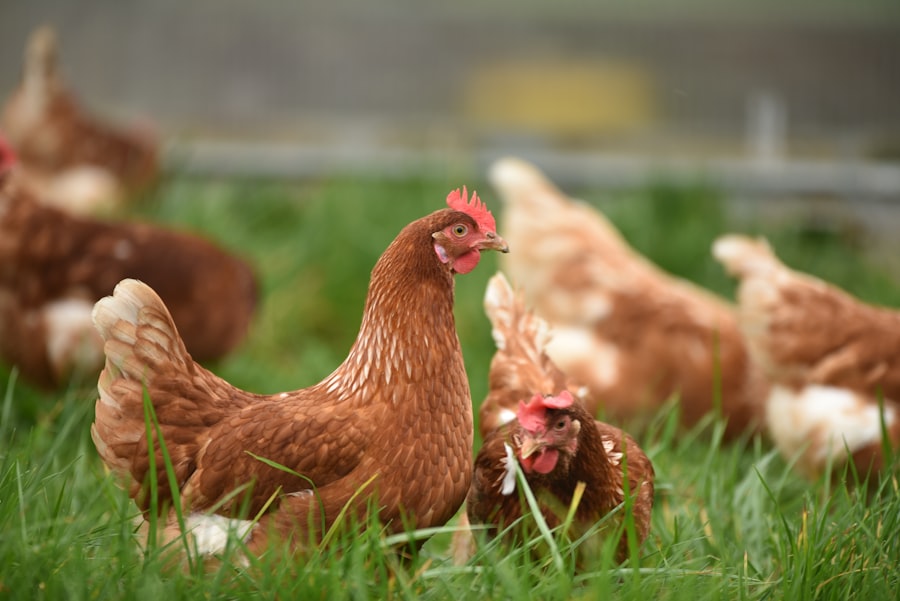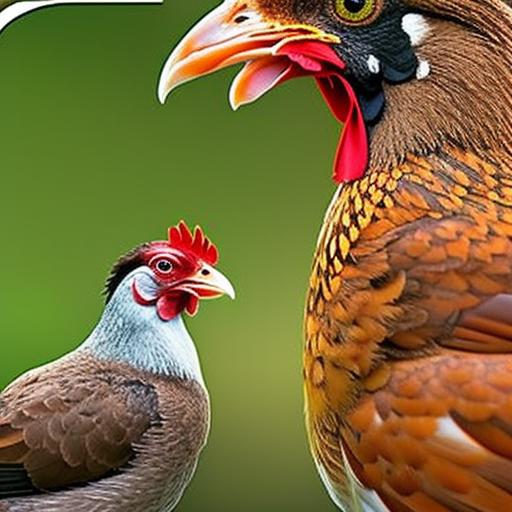Keeping chickens as a hobby has become increasingly popular in recent years. Not only do chickens provide fresh eggs, but they also offer a fun and educational experience for the whole family. Raising chickens can teach children about responsibility, sustainability, and the importance of caring for animals. In addition, chickens can be a great source of entertainment and companionship. Whether you live in a rural area or an urban setting, keeping chickens can be a rewarding and enjoyable hobby.
Key Takeaways
- Keeping chickens can provide numerous benefits, including fresh eggs and natural pest control.
- Before getting chickens, it’s important to research local laws and regulations and choose the right breed for your needs.
- Building a suitable chicken coop requires selecting a location, designing and constructing the coop, and choosing the right materials and tools.
- Feeding and watering chickens involves understanding their nutritional needs, choosing the right feed and supplements, and providing fresh water daily.
- Maintaining chicken health and hygiene involves recognizing common health issues, preventing and treating illnesses, and maintaining a clean environment.
Preparing for Chickens
Before diving into the world of chicken keeping, it is important to do some research and preparation. First and foremost, check your local laws and regulations to ensure that you are allowed to keep chickens in your area. Some cities have restrictions on the number of chickens you can have or require permits for keeping them. It is essential to comply with these regulations to avoid any legal issues.
Once you have confirmed that you can keep chickens, it is time to choose the right breed for your needs. There are various breeds available, each with its own characteristics and purposes. If you are primarily interested in fresh eggs, consider getting egg-laying breeds such as Rhode Island Reds or Leghorns. On the other hand, if you are interested in meat production, consider getting meat-producing breeds such as Cornish Cross or Plymouth Rocks.
Understanding basic chicken care is crucial before bringing them home. Chickens need proper nutrition, shelter, and care to thrive. They require a balanced diet consisting of grains, protein, vitamins, and minerals. Additionally, they need access to fresh water at all times. Providing a safe and comfortable environment is also essential for their well-being.
Building a Chicken Coop
Building a chicken coop is an important step in keeping chickens as a hobby. The coop provides shelter and protection from predators while also giving the chickens a place to roost and lay eggs. When selecting a location for the coop, choose a shaded area with good drainage. This will help keep the chickens cool in the summer and prevent waterlogging during rainy seasons.
Designing and constructing the coop will depend on the number of chickens you plan to keep and your budget. The coop should be spacious enough to allow the chickens to move around comfortably. It should also have nesting boxes for egg-laying and perches for roosting. Consider using sturdy materials such as wood and wire mesh to ensure the coop is secure and durable.
Feeding and Watering Chickens
Feeding chickens a balanced diet is essential for their health and egg production. Chickens require a combination of grains, protein, vitamins, and minerals to stay healthy. Commercial chicken feed is readily available and provides all the necessary nutrients. However, you can also supplement their diet with kitchen scraps, fruits, vegetables, and insects.
Fresh water is crucial for chickens’ well-being. Ensure that they have access to clean water at all times. Consider using a waterer that is easy to refill and clean. During hot weather, it is important to provide additional water sources or use automatic waterers to prevent dehydration.
Health and Hygiene
Maintaining the health and hygiene of your chickens is vital for their overall well-being. Regularly inspect your chickens for any signs of illness or injury. Common health issues in chickens include mites, respiratory infections, and parasites. Take preventative measures such as regular cleaning of the coop, providing fresh bedding, and using appropriate pest control methods to keep your chickens healthy.
Cleaning the coop regularly is essential for maintaining a clean and sanitary environment. Remove any droppings, old bedding, or uneaten food from the coop on a regular basis. Replace the bedding with fresh material to prevent the buildup of bacteria or parasites.
Egg Production

If you are keeping chickens primarily for fresh eggs, understanding the egg-laying process is important. Chickens typically start laying eggs at around 5-6 months of age. The frequency of egg production will depend on the breed and individual chicken. To maximize egg production, ensure that your chickens have a balanced diet, access to fresh water, and a comfortable nesting area.
Collecting and storing eggs properly is crucial to ensure they are safe to eat. Collect eggs daily to prevent them from getting dirty or cracked. Store eggs in a cool and dry place, preferably in a refrigerator. It is important to wash eggs only when you are ready to use them, as washing can remove the protective coating on the shell.
Chicken Behavior and Socialization
Understanding chicken behavior and communication is essential for creating a harmonious flock. Chickens have a social hierarchy known as the pecking order. This determines the dominance and submission within the flock. It is important to provide enough space for chickens to establish their pecking order without causing excessive aggression.
Encouraging socialization among chickens is important for their well-being. Provide enough space for them to move around freely and interact with each other. Additionally, consider providing toys or objects for them to peck at or explore. This can help prevent boredom and aggressive behavior.
If you notice any aggressive behavior among your chickens, it is important to address it promptly. Aggressive chickens should be separated from the flock to prevent injuries. Observe their behavior closely and reintroduce them gradually once they have calmed down.
Predators and Pests
Protecting your chickens from predators and pests is crucial for their safety. Common predators include raccoons, foxes, snakes, and rats. To prevent predator attacks, ensure that the coop is secure with sturdy fencing and wire mesh. Regularly inspect the coop for any signs of damage or potential entry points.
Pests such as mites, lice, and flies can also pose a threat to your chickens’ health. Regularly inspect your chickens for any signs of infestation, such as feather loss or excessive scratching. Treat any infestations promptly using appropriate pest control methods. Additionally, keep the coop clean and dry to prevent the buildup of pests.
Winter Care
Preparing your chickens for cold weather is important to ensure their well-being. Chickens are generally hardy animals, but they can still be susceptible to cold temperatures and winter health issues. Provide extra insulation in the coop by adding straw or hay to keep them warm. Ensure that the coop is well-ventilated to prevent moisture buildup.
During winter, it is important to provide shelter and protection from the elements. This can be achieved by using tarps or plastic sheeting to cover the coop and block out wind and snow. Monitor your chickens’ health closely during winter and take preventative measures to prevent common issues such as frostbite.
Keeping chickens as a hobby can be a rewarding and enjoyable experience. Not only do chickens provide fresh eggs, but they also offer a fun and educational activity for the whole family. By doing proper research and preparation, building a suitable coop, providing proper nutrition and care, and understanding chicken behavior and health, you can create a thriving flock of chickens. Remember to always comply with local laws and regulations and continue learning about chicken care through books, online forums, and other resources.
If you’re a beginner looking to start keeping chickens, you’ll definitely want to check out this helpful article on different types of chicken coops. Whether you’re interested in a portable coop like the one featured in this Chicken Coop Portage article, or a unique option like a trampoline coop as discussed in this Chicken Coop Trampoline article, there are plenty of options to suit your needs. You might also find inspiration from this Garden Chicken Coop article if you’re looking to incorporate your chickens into your garden space. Happy reading and happy chicken-keeping!
FAQs
What are the benefits of keeping chickens?
Keeping chickens can provide a source of fresh eggs, fertilizer for gardens, and entertainment. They also help control pests and weeds in the yard.
What do chickens need to be healthy?
Chickens need access to clean water, a balanced diet of feed, shelter from the elements, and protection from predators. They also need space to move around and exercise.
What kind of housing do chickens need?
Chickens need a coop that is dry, well-ventilated, and secure from predators. The coop should also have nesting boxes for laying eggs and perches for roosting at night.
What do chickens eat?
Chickens need a balanced diet of feed that includes protein, carbohydrates, vitamins, and minerals. They also enjoy eating fresh fruits and vegetables, and can forage for insects and plants in a fenced yard.
How often do chickens lay eggs?
Most chickens lay eggs daily or every other day, depending on their breed and age. However, egg production can decrease during the winter months or when chickens are stressed.
How do you care for baby chicks?
Baby chicks need a warm, dry environment with access to clean water and chick starter feed. They also need protection from predators and regular cleaning of their bedding.
What are some common health issues for chickens?
Common health issues for chickens include respiratory infections, parasites, and egg-laying problems. Regular cleaning and monitoring of chickens can help prevent and treat these issues.
Meet Walter, the feathered-friend fanatic of Florida! Nestled in the sunshine state, Walter struts through life with his feathered companions, clucking his way to happiness. With a coop that’s fancier than a five-star hotel, he’s the Don Juan of the chicken world. When he’s not teaching his hens to do the cha-cha, you’ll find him in a heated debate with his prized rooster, Sir Clucks-a-Lot. Walter’s poultry passion is no yolk; he’s the sunny-side-up guy you never knew you needed in your flock of friends!







